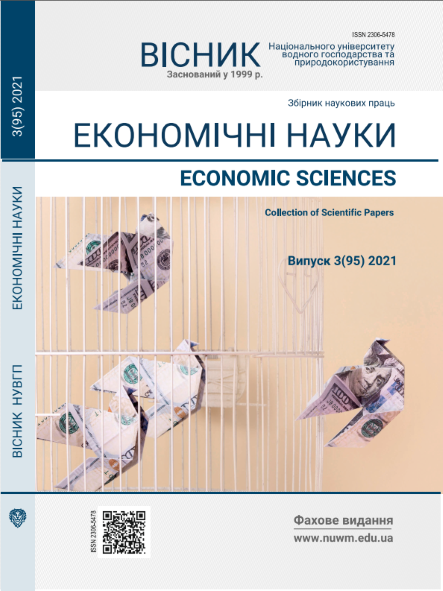MODERN APPROACHES TO THE FUNCTIONING OF MICRO-, MACRO- AND INTERNATIONAL ECONOMY IN THE CONCEPT OF THE HAPPINESS ECONOMY
DOI:
https://doi.org/10.31713/ve320211Keywords:
economy of happiness, GDP, ethics, economic behavior, Gross national happiness.Abstract
The aim of the article is to generalize scientific approaches to the assessment of the economy of happiness as a transformational concept in the functioning of micro-, macro- and international economy. The article considers historical approaches to the formation of the economic theory of happiness. Indicators of gross domestic product and gross national happiness as indicators of national policy achievements are studied. The preconditions for the formation of the theory of the economy of happiness, its economic and ethical context, debatable views on the possibility of quantitative measurement of happiness are analyzed. Analysis of the main provisions of the happiness economy and its level in Ukraine allows us to draw the following conclusions. Economic growth as the basis of growing consumption has objectively determined resource limits, and hence limited opportunities and economies of consumption. In addition, ignoring the environmental aspects of production leads to environmental pollution and exacerbation of global environmental problems. The purpose of the search for economic meanings of happiness is to identify new challenges related to changing the neoclassical parameters of the micro-, macro- and international economy and supplementing them with value-semantic aspects of human economic activity. The economics of happiness is a formal academic study of the relationship between personal satisfaction and economic problems such as employment and wealth. The main tools used include surveys and indicators that track what different economies offer their residents. The collection of happiness data can have a number of purposes, including assisting governments in developing better public policies. However, happiness is a subjective measure, and therefore it is difficult to classifyReferences
Воробьев Е. М., Демченко Т. И. Экономика счастья как новая экономическая парадигма. Вісник Харківського національного університету імені В. Н. Каразіна. Серія : Міжнародні відносини. Економіка. Країнознавство. Туризм. 2013. № 1086. Вип. 2. С. 74-77. URL: http://nbuv.gov.ua/UJRN/VKhMv_2013_1086_2_15 (дата звернення: 02.09.2021 р.).
Сакс Дж. Экономика счастья. URL: http://www.project-syndicate. org/commentary/sachs181/Russian (дата звернення: 02.09.2021 р.).
Липов В. В. Альтернативні парадигми економічної теорії: між багатством націй та суспільним щастям. Економічний розвиток і спадщина Семена Кузнеця: міжнар. наук. конф. (31 травня-1 червня 2018 р.) Харків : ХНЕУ ім. С. Кузнеця, 2018. С. 87-88.
Hanna Vereshchahina and Fedir Shigol (2020). Theoretical foundations, practice, and empirical approaches to assessing the economy of happiness. Development Management, 18(2), 33-42. doi:10.21511/dm.18(2).2020.04. (дата звернення: 02.09.2021 р.).
Лавриненко В. М. Запити економічних смислів щастя. Вісник Академії праці і соціальних відносин Федерації профспілок України. 2013. № 3. С. 56-60.
Світове дослідження цінностей в Україні 2020. URL : http://ucep.org.ua/wp-content/uploads/2020/11/WVS_UA_2020_report_WEB.pdf. (дата звернення: 02.09.2021 р.).
Liberto D. Happiness Economics. URL: https://www.investopedia.com/terms/h/happiness-economics.asp (дата звернення: 02.09.2021 р.).
Fox Justin. The Economics of Well-Being. Harvard Business Review. URL: https://hbr.org/2012/01/the-economics-of-well-being (дата звернення: 02.09.2021 р.).

